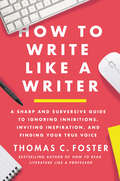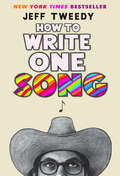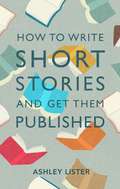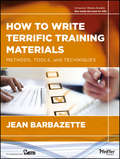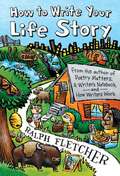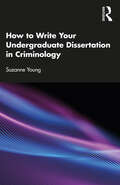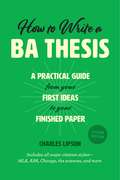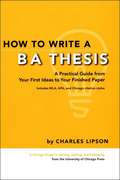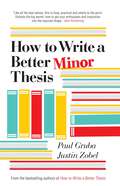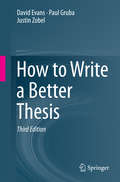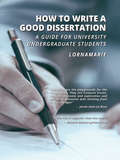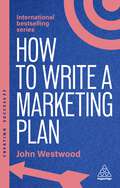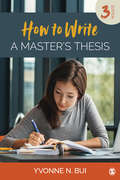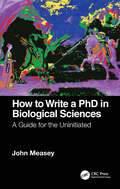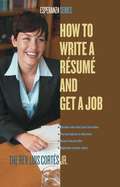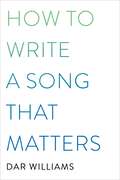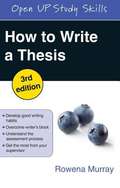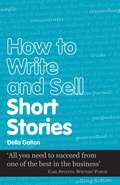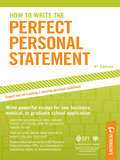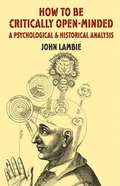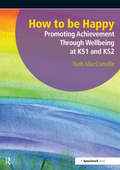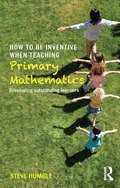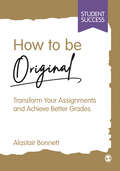- Table View
- List View
How to Write Like a Writer: A Sharp and Subversive Guide to Ignoring Inhibitions, Inviting Inspiration, and Finding Your True Voice
by Thomas C FosterThe New York Times bestselling author of the beloved classic How to Read Literature Like a Professor teaches you how to write everything from a report for your community association to a meaningful memoir in this masterful and engaging guide.Combing anecdotes and hard-won lessons from decades of teaching and writing—and invoking everyone from Hemingway to your third-grade teacher—retired professor Thomas C. Foster guides you through the basics of writing. With How to Write Like a Writer you’ll learn how to organize your thoughts, construct first drafts, and (not incidentally) keep you in your chair so that inspiration can come to visit.With warmth and wit, Foster shows you how to get into (and over) your best self, how to find your voice, and how to know when, if ever, a piece of work is done.Packed with enlightening anecdotes, highlighted with lists and bullet points, this invaluable guide reveals how writers work their magic, and reminds us that we all—for better or worse, whether we mean to or not—are known by what we put on paper or screen, both our thoughts and our words.
How to Write One Song: Loving The Things We Create And How They Love Us Back
by Jeff TweedyThere are few creative acts more mysterious and magical than writing a song. But what if the goal wasn't so mysterious and was actually achievable for anyone who wants to experience more magic and creativity in their life? That's something that anyone will be inspired to do after reading Jeff Tweedy's How to Write One Song. Why one song? Because the difference between one song and many songs isn't a cute semantic trick—it's an important distinction that can simplify a notoriously confusing art form. The idea of becoming a capital-S songwriter can seem daunting, but approached as a focused, self-contained event, the mystery and fear subsides, and songwriting becomes an exciting pursuit. And then there is the energizing, nourishing creativity that can open up. How to Write One Song brings readers into the intimate process of writing one song—lyrics, music, and putting it all together—and accesses the deep sense of wonder that remains at the heart of this curious, yet incredibly fulfilling, artistic act. But it&’s equally about the importance of making creativity part of your life every day, and of experiencing the hope, inspiration, and joy available to anyone who&’s willing to get started.
How to Write Short Stories and Get Them Published
by Ashley ListerThis book will help you plot like a pro, master the art of suspense like Poe, craft captivating dialogue like Twain and - most crucially - get your short stories published.How to Write Short Stories and Get Them Published is the essential guide to writing short fiction. It takes the aspiring writer from their initial idea through to potential outlets for publication and pitching proposals to publishers. Along the journey this guide considers the most important aspects of creative writing, such as character, plot, point of view, description and dialogue. All of these areas are illustrated with examples of classic fiction, and accompanied by exercises that will help every writer hone their natural skill and talent into the ability to craft compelling short stories.
How to Write Short Stories and Get Them Published
by Ashley ListerThis book will help you plot like a pro, master the art of suspense like Poe, craft captivating dialogue like Twain and - most crucially - get your short stories published.How to Write Short Stories and Get Them Published is the essential guide to writing short fiction. It takes the aspiring writer from their initial idea through to potential outlets for publication and pitching proposals to publishers. Along the journey this guide considers the most important aspects of creative writing, such as character, plot, point of view, description and dialogue. All of these areas are illustrated with examples of classic fiction, and accompanied by exercises that will help every writer hone their natural skill and talent into the ability to craft compelling short stories.
How to Write Terrific Training Materials: Methods, Tools, and Techniques
by Jean BarbazetteNow you can access Jean Barbazette's systematic process for creating winning training materials that will help raise your skills to the next level. The book is filled with easy-to-use tools and templates that answer all the questions trainers, course designers, and subject matter experts (SMEs) have about what it takes to develop training materials and how they can easily create the best training program in the shortest amount of time. "Jean is a master at providing her readers with new ideas and innovative approaches to the art of delivering excellent learning solutions. Our field has gone through so many changes and Jean is on top of them and out in front all at the same time. Bravo!" —Beverly Kaye, founder/chairman of the board, Career Systems International and coauthor of Help Them Grow or Watch Them Go "Barbazette has done it again: she has made your job easier with step-by-step guidelines for developing training materials. Jean covers the entire process in her typical easy-to-follow manner, simplifying the complicated and making you the hero! Don't miss this one!" —Elaine Biech, ebb associates inc. and author of The Business of Consulting "Once again master trainer Barbazette has provided an elegantly simple, step-by-step guide to what can often be the most tedious part of the training process: writing training materials that support and expand a learner's results. Both seasoned professional and newcomer will find this an easy-to-follow guide and valuable resource to be used over and over." —Eileen McDargh, president, McDargh Communications, and author of Talk Ain't Cheap — It's Priceless "Barbazette is back to fill another gap in the training literature. This extensive work on how and when to write training materials is chock-full of templates and other tools. Systematic and thorough, this is an exceptional guide for those wanting to efficiently create successful training interventions." —Jane Bozarth, Ed.D., eLearning Coordinator, State of North Carolina and author of Better Than Bullet Points
How to Write Your Life Story
by Ralph FletcherLies About Writing Your Life Story You have to be a famous celebrity. You must have an amazing life. You can't write your life story until you're old and gray. Nobody will read it, so what's the point?
How to Write Your Undergraduate Dissertation in Criminology
by Suzanne YoungThis book provides a guide for undergraduate criminology and criminal justice students undertaking their final-year dissertation. It speaks to the specific challenges for criminology students who may wish to research closed institutions (such as prisons, courts, or the police) or vulnerable populations (such as people with convictions, victims of crime, or young people), and offers guidance on how to undertake research on these topics whilet avoiding many of the access and ethical obstacles. It takes students through each phase of the dissertation, from designing and planning the research to writing up and presenting the completed work. The complexities of undertaking research on sensitive topics and with criminal justice institutions are discussed throughout, offering an insight into some of the challenges that students may be faced with and suggestions to overcome obstacles. It offers practical guidance for empirical and library-based projects and provides students with suggested resources for accessing primary and secondary data. It utilises a mixture of worked examples, top tips, practical strategies, and student activities to ensure the dissertation is a manageable and enjoyable process. This book will be beneficial to all undergraduate criminology students who have to undertake either a library-based or empirical dissertation. The examples and activities in the book will also be useful for dissertation supervisors who can use them to support their dissertation students.
How to Write a BA Thesis, Second Edition: A Practical Guide from Your First Ideas to Your Finished Paper (Chicago Guides to Writing, Editing, and Publishing)
by Charles LipsonHow to Write a BA Thesis is the only book that directly addresses the needs of undergraduate students writing a major paper. This book offers step-by-step advice on how to move from early ideas to finished paper. It covers choosing a topic, selecting an advisor, writing a proposal, conducting research, developing an argument, writing and editing the thesis, and making through a defense. Lipson also acknowledges the challenges that arise when tackling such a project, and he offers advice for breaking through writer’s block and juggling school-life demands. This is a must-read for anyone writing a BA thesis, or for anyone who advises these students.
How to Write a BA Thesis: A Practical Guide from Your First Ideas to Your Finished Paper
by Charles LipsonThe senior thesis is the capstone of a college education, but writing one can be a daunting prospect. Students need to choose their own topic and select the right adviser. Then they need to work steadily for several months as they research, write, and manage a major independent project. Now there's a mentor to help. How to Write a BA Thesis is a practical, friendly guide written by Charles Lipson, an experienced professor who has guided hundreds of students through the thesis-writing process. This book offers step-by-step advice on how to turn a vague idea into a clearly defined proposal, then a draft paper, and, ultimately, a polished thesis. Lipson also tackles issues beyond the classroom-from good work habits to coping with personal problems that interfere with research and writing. Filled with examples and easy-to-use highlighted tips, the book also includes handy time schedules that show when to begin various tasks and how much time to spend on each. Convenient checklists remind students which steps need special attention, and a detailed appendix, filled with examples, shows how to use the three main citation systems in the humanities and social sciences: MLA, APA, and Chicago. How to Write a BA Thesis will help students work more comfortably and effectively-on their own and with their advisers. Its clear guidelines and sensible advice make it the perfect text for thesis workshops. Students and their advisers will refer again and again to this invaluable resource. From choosing a topic to preparing the final paper, How to Write a BA Thesis helps students turn a daunting prospect into a remarkable achievement.
How to Write a Better Minor Thesis
by David Evans Paul Gruba Justin ZobelWhat is expected? What should the thesis consist of? How can the whole process be made a bit easier? How to achieve the best possible result? Working within strict time limits, and under pressure right from the start, what does the student need to do to ensure that the thesis is finished? In How to Write a Better Minor Thesis, experienced advisors Dr Paul Gruba and Professor Justin Zobel lay out step-by-step guidelines for writing a minor thesis. Based on decades of working with students undertaking their first piece of research, they take novice researchers through the process of completing a minor thesis from initial steps to final on-time submission. Written in a friendly manner, this concise book—a companion to their senior text on the challenges of research writing, How To Write A Better Thesis—will help you to successfully tackle this fresh challenge. How to Write a Better Minor Thesis contains sections of condensed material from How To Write A Better Thesis, complementing the entirely new material written for minor thesis students.
How to Write a Better Thesis
by David Evans Paul Gruba Justin ZobelFrom proposal to examination, producing a dissertation or thesis is a challenge. Grounded in decades of experience with research training and supervision, this fully updated and revised edition takes an integrated, down-to-earth approach drawing on case studies and examples to guide you step-by-step towards productive success. Early chapters frame the tasks ahead and show you how to get started. From there, practical advice and illustrations take you through the elements of formulating research questions, working with software, and purposeful writing of each of the different kinds of chapters, and finishes with a focus on revision, dissemination and deadlines. How to Write a Better Thesis presents a cohesive approach to research that will help you succeed.
How to Write a Good Dissertation A guide for University Undergraduate Students
by LornaMarieHow to Write a Good Dissertation - A Guide for University Undergraduate Students is an essential reference guide for university undergraduate student and anyone who wishes to write at professional level. Every undergraduate student will at some point be required to write a dissertation, project, a portfolio or thesis. This could be daunting and having gone through that experience myself, I thought a book like this would be helpful to students around the world. I have tried to keep it concise, succinct, and as brief as much as possible; the last thing a student need is reading a lengthy guide on how to write their onerous project. Most of the chapters cover topics every student will find useful regardless of their course of study. This book covers essential policies, guidelines and procedures set out in the code of practice for writing projects in most reputable universities around the world. The author covered essential topics that every student must have at their fingertips such as choosing a research topic, using the library and using database for searches, copyright, editing, gathering and collating information, citing references, code of practice in research, evidence-based approach, confidentiality, privacy and data protection, and virtual learning environment. Formatting, editing, binding and finishing your project are all succinctly explained in simple English language in this book.
How to Write a Marketing Plan: Define Your Strategy, Plan Effectively and Reach Your Marketing Goals (Creating Success)
by John WestwoodA step-by-step guide to creating a successful marketing plan: from carrying out a marketing audit, setting objectives and devising budgets to writing, presenting and implementing the plan.How to Write a Marketing Plan includes advice on producing mini-plans and the most current information on email marketing, web usage, mobile commerce and social media. This 8th edition now features even more practical exercises, useful templates, and top tips to help you develop this all-important business skill. Including helpful chapter summaries and a detailed sample marketing plan, it is essential reading for anyone who wants to boost their product or business.The Creating Success series of books...Unlock vital skills, power up your performance and get ahead with the bestselling Creating Success series. Written by experts for new and aspiring managers and leaders, this million-selling collection of accessible and empowering guides will get you up to speed in no time. Packed with clever thinking, smart advice and the kind of winning techniques that really get results, you'll make fast progress, quickly reach your goals and create lasting success in your career.
How to Write a Master′s Thesis
by Yvonne N. Bui"This is the best textbook about writing an M.A. thesis available in the market." –Hsin-I Liu, University of the Incarnate Word The Third Edition of How to Write a Master′s Thesis is a comprehensive manual on how to plan and write a five-chapter master’s thesis, and a great resource for graduate students looking for concrete, applied guidance on how to successfully complete their master′s degrees. While research methods and statistics courses may teach students the basic information on how to conduct research, putting it all together into a single project and document can be a challenge. Author Yvonne Bui demystifies this process by integrating the language learned in prerequisite methods and statistics courses into a step-by-step guide for developing a student′s own thesis or project.
How to Write a Master′s Thesis
by Yvonne N. Bui"This is the best textbook about writing an M.A. thesis available in the market." –Hsin-I Liu, University of the Incarnate Word The Third Edition of How to Write a Master′s Thesis is a comprehensive manual on how to plan and write a five-chapter master’s thesis, and a great resource for graduate students looking for concrete, applied guidance on how to successfully complete their master′s degrees. While research methods and statistics courses may teach students the basic information on how to conduct research, putting it all together into a single project and document can be a challenge. Author Yvonne Bui demystifies this process by integrating the language learned in prerequisite methods and statistics courses into a step-by-step guide for developing a student′s own thesis or project.
How to Write a PhD in Biological Sciences: A Guide for the Uninitiated
by John MeaseyYou don’t have to be a genius to write a PhD. Of course, it will always involve a lot of hard work and dedication, but the process of writing is a whole lot easier if you understand the basic ground rules. This book is a guide through the dos and don’ts of writing a PhD. It will be your companion from the point when you decide to do a PhD, providing practical guidance to getting started, all the way through the nuts and bolts of the writing and editing process. It will also help you to get - and stay - in the right mental framework and establish good habits from the beginning, putting you in a commanding position later on. Examples are tailored to the biological sciences, offering a unique reference for PhD students in these disciplines. Embarking on a PhD doesn’t need to be daunting, even if it’s your first experience working within academia. Each short section focuses on writing - considered by many to be the most difficult aspect of a PhD - and delves into a practical detail of one aspect, from the title to the supplementary material. Whether you’re a student just starting your studies, an early career researcher or a supervisor struggling to cope, the book provides the insider information you need to get ahead.
How to Write a Resume and Get a Job
by Luis CortesHow To Write A Résumé And Get A Job Finding a job can be nerve-racking. It's hard to know even where to begin: Where are jobs listed? What skills do you need? How can you make your résumé stand out? A job hunt involves many unspoken rules that can't be broken, and it's easy to unknowingly hurt your chances. In How to Write a Résumé and Get a Job, the Reverend Luis Cortés Jr. supplies you with the necessary information for securing a promising job. He will lead you through every step, from searching and applying to negotiating for a better salary, asking for benefits, and enjoying your success. A job isn't everything, but it is your key to a better future. Following Cortés's guidance ensures that your search will be a successful one.
How to Write a Song that Matters
by Dar WilliamsAn effective and inspiring guide to songwriting by prolific, iconic singer-songwriter Dar Williams.How to Write a Song That Matters is an invaluable guide to writing music by a woman who knows how to do it and do it well: iconic singer-songwriter, Dar Williams. For years now, Williams has led songwriting retreats for musicians, from beginners to professionals, in which she elevates the process of songwriting over the assessment of the product. This book makes those intimate experiences accessible for songwriters across the globe, gifting them with the insight Williams has gleaned from her decades of experience. First, it encourages songwriters to find something that inspires them and then to follow that inspiration, letting the clues of those first few notes or lines lead their narrative. Soon, the initial rhythms, the unique sounds of the melody, and/or specific vocabulary emerge, giving birth to a "voice" or a "world" that the song can exist in. As the writer proceeds, Williams encourages them to ask themselves: "Where did I go? Where did I REALLY go? What happened? What REALLY happened? What am I bringing back?" There are many other songwriting guides that hint to the reader that writing a "hit song" may be on the horizon if only the reader correctly follows the guide or program. In this book, however, Williams shows readers how to tap into their OWN creative process, using their psyches, their unique life experiences, and their muses to write the songs that they are meant to write. By focusing on the process of creating a song that matters, as opposed to producing a well-constructed "widget from a song factory," songwriters will be able to establish their own voice and use it to make meaningful music. Perfect for music lovers of all sorts who want to write songs, How to Write a Song That Matters is a one-of-a-kind-book that readers will turn to for guidance time and time again.
How to Write a Thesis
by Rowena Murray"This book has become a trusted resource for students from a wide range of disciplinary backgrounds. Not only does it take you through the steps and stages of thesis writing,but more importantly, it offers rich advice and support that helps build confidence,sets up effective writing habits and generates a positive orientation towards thecomplex task of thesis writing. " Professor Sarah Moore, Associate Vice President Academic,University of Limerick, Ireland "I've found Rowena's shrewd and insightful suggestions for writing helpful, not onlyfor others but also for me. " Peter Elbow, University of Massachusetts, Amherst, USA "This book is a brilliant resource for all doctoral students to help guide them through the completion of their doctoral thesis. The book develops students' confidence and motivates them to start the writing process. " Emma Jackson,Second Year PhD Student, University of Worcester, UK Providing down-to-earth guidance to help students shape their theses, Rowena Murray offers valuable advice and practical tips and techniques. Useful summaries and checklists help students to stay on track or regain their way. Moving beyond the basics of thesis writing, the book introduces practical writing techniques such as freewriting, generative writing and binge writing. Issues such as working out the criteria for your thesis, writer's block, writing a literature review and making notes into a draft are also covered. New to this edition: New introduction by students - 'How I used this book' Update on doctoral skills set and Training Needs Analysis Extended treatment of plagiarism - and how to avoid it Expanded section on students' well-being Learning outcomes for each chapter
How to Write and Sell Short Stories
by Della GaltonA must-have book for any new writer and a welcome addition to the library of established writers who are hoping to 'up their game'. Have you ever wondered why your short stories are rejected? What is the secret of selling your work? How do you make sure your characters are memorable, your plots realistic and your twists both satisfying and unpredictable? Della Galton answers these and many more questions using a format that will already be familiar to writers: What? Why? When? How? Where? and Who? The Author: Della Galton has been selling short stories for twenty years. She sells between 90 and 100 short stories a year to markets in the UK and abroad. She also teaches creative writing and is a popular speaker at writers' conferences across the UK. Dozens of her students have achieved success in the very competitive field of magazine fiction. Della is also the author of two published novels, Passing Shadows and Helter Skelter.
How to Write the Perfect Personal Statement
by Mark Alan StewartThe admissions process for law, business, medical, or graduate school is more competitive today than ever before. Peterson's How to Write the Perfect Personal Statement provides essential tips on how to create and write personal statements that respond to the questions that appear on the applications of many popular graduate schools. The guide also offers great insight on whom to approach for letters of recommendation and how to make the best impression at the interview. How to Write the Perfect Personal Statement features 30 actual samples of successful application essays as well as recommendations from admissions officers on winning strategies that have guaranteed students admission into business, law, medical, and graduate school. How to Write the Perfect Personal Statement offers step-by-step instructions on style, format, concept, and theme; preparation strategies for the personal interview; tactics on whom to ask to write letters of recommendation; top 10 DOs and DON'Ts for writing the essay; tips from admission officials from Columbia, Michigan, and other high-profile schools; and much more!
How to be Critically Open-Minded -- A Psychological and Historical Analysis
by John LambieIn a lively and subversive analysis, psychologist John Lambie explains how to see another person's point of view while remaining critical - in other words how to be 'critically open-minded'. Using entertaining examples from history and psychology, Lambie explores the implications of critical open-mindedness for scientific and moral progress.
How to be Happy: Promoting Achievement Through Wellbeing at KS1 and KS2
by Ruth MacConville'Success is not the key to happiness, happiness is the key to success'. Albert Schweitzer Research over the last few years has explored the patterns of thinking, feeling and relating that create human success. It is recognised that wellbeing is not a stand alone feature of individuals, rather it is inextricably linked to that individual's ability to flourish and achieve. The connection between education and happiness is firmly established, confirming what teachers already know, happy children learn and perform better than unhappy children. This programme introduces the core elements of positive psychology and conveys them in a clear and practical way for primary aged children. The 15 sessions aim to teach pupils how to: realise their personal strengths; connect healthily with others; build friendships; and, reach out to trustworthy adults. There are full facilitator notes with all the necessary resources to run an interactive programme that will be delivered with a sense of fun, to engage and inspire all learners. To support the programme the book also contains a section on the key concepts of positive psychology that underpin the sessions, a PowerPoint for staff training and a CD - Rom with copiable resources and useful websites.
How to be Inventive When Teaching Primary Mathematics: Developing outstanding learners
by Steve HumbleHave you ever taken your children on a maths walk? Are your pupils shape detectives? How to be Inventive When Teaching Primary Mathematics is a pocket guide to inspire primary teachers to become confident, effective, imaginative teachers who enjoy teaching, and whose pupils enjoy learning. It is packed with exciting, creative, unexpected ideas, to help teachers and pupils open their eyes to the mathematical world around them. It gives teachers the tools to develop their own classroom activities and experiences, supporting learners as they move fluently between mathematical ideas and develop their ownership of mathematics: Take your pupils on a maths walk, meet dinosaurs, visit art galleries, learn your destiny number, create your first human graph in the playground and learn how to be an algebra magician. Written by Steve Humble, expert teacher, teacher trainer and, as Dr Maths, advocate for the power and potential of mathematics, this friendly, stimulating guide offers a fresh, practical approach to teaching mathematics, based on the best research and practice, and years of experience in the field. Focussing on five key mathematical topics - number, geometry, measurement, statistics and algebra – it is structured in the form of a journey, introducing historical facts, ideas for innovative and inventive classroom activities and explorations of the key misconceptions for each topic. How to be Inventive When Teaching Primary Mathematics will challenge you to think about your own beliefs and how they influence your practice, and help you understand how best to transform your teaching to stimulate children’s emotions to improve knowledge, learning and enjoyment of the beauty of maths.
How to be Original: Transform Your Assignments and Achieve Better Grades (Student Success)
by Alastair BonnettOriginality is needed to achieve top marks in assignments, but what does it even mean? Simply put, it opens doors: to making a difference; to excellent marks, to success. You’ll often find marking criteria stating you need to make an ‘original contribution’, ‘show originality’, or ‘evidence of originality’, yet it is not taught or even explained. This book addresses this, providing you with the techniques and methods you need to transform your work and achieve better grades. It will even give you the upper hand in the age of AI. Key features include: · Diverse examples of originality in writing · "Try this" exercises, allowing you to develop your skills · Different ways of being original, such as taking photos and drawing maps · Originality in different forms of assignments, such as presentations and exams With the guidance in this book, anyone can be original. Student Success is a series of essential guides for students of all levels. From how to think critically and write great essays to boosting your employability and managing your wellbeing, the Student Success series helps you study smarter and get the best from your time at university.
